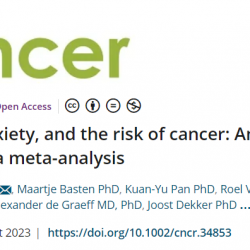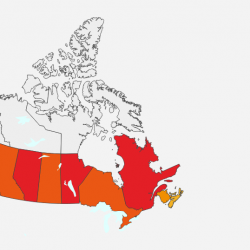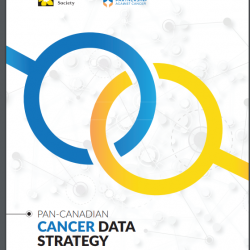Authors: LonnekeA. van Tuijl, Maartje Basten, Kuan‐Yu Pan, Roel Vermeulen, Lützen Portengen, Alexander de Graeff, Joost Dekker, Mirjam I. Geerlings, Adriaan Hoogendoorn, Femke Lamers, Adri C. Voogd, Jessica Abell, Philip Awadalla, Aartjan T.F. Beekman, Ottar Bjerkeset, Andy Boyd, |Yunsong Cui, Philipp Frank, Henrike Galenkamp, Bert Garssen, Sean Hellingman, Martijn Huisman, Anke Huss, Trynke R. de Jong, Melanie R. Keats, Almar A. L. Kok, Steinar Krokstad, Flora E. van Leeuwen, Annemarie I. Luik, Nolwenn Noisel, N. Charlotte Onland‐Moret, Yves Payette, Brenda W. J. H. Penninx, Ina Rissanen, Annelieke M. Roest, Rikje Ruiter, Robert A. Schoevers, David Soave, Mandy Spaan, Andrew Steptoe, Karien Stronks, Erik R. Sund, Ellen Sweeney, Emma L. Twait, Alison Teyhan, W. M. Monique Verschuren, Kimberly D. van der Willik, Judith G. M. Rosmalen, Adelita V. Ranchor. Journal: Cancer Abstract: Background: Depression and anxiety have long been hypothesized to be related to an increased cancer risk. Despite the great amount of research that has been conducted, findings are inconclusive. To provide a stronger basis for addressing the associations between depression, anxiety, and the incidence of various cancer types (overall, breast, lung, prostate, colorectal, alcohol-related, and smoking-related cancers), individual participant data (IPD) meta-analyses were performed within the Psychosocial Factors and Cancer Incidence (PSY-CA) consortium. Methods: The PSY-CA consortium includes data from 18 cohorts with measures of depression or anxiety (up to N = 319,613; cancer incidences, 25,803; person-years of follow-up, 3,254,714). Both symptoms and a diagnosis of depression and anxiety were examined as predictors of future cancer risk. Two-stage IPD meta-analyses were run, first by using Cox regression models in each cohort (stage 1), and then by aggregating the results in random-effects meta-analyses (stage 2). Results: No associations were found between depression or anxiety and overall, breast, prostate, colorectal, and alcohol-related cancers. Depression and anxiety (symptoms and diagnoses) were associated with the incidence of lung cancer and smoking-related cancers (hazard ratios [HRs], 1.06–1.60). However, these associations were substantially attenuated when additionally adjusting for known risk factors including smoking, alcohol use, and body mass index (HRs, 1.04–1.23). Conclusions: Depression and anxiety are not related to increased risk for most cancer outcomes, except for lung and smoking-related cancers. This study shows that key covariates are likely to explain the relationship between depression, anxiety, and lung and smoking-related cancers. doi: https://doi.org/10.1002/cncr.34853










